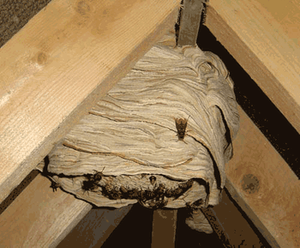Questions answered about wasps - Page:4
Should I block the entrance to a wasp nest?
DO NOT BLOCK THE ENTRANCE TO A WASP, HORNET OR BEE NEST!
Blocking a nest is one of the worst ways to deal with a wasp problem. If you block the nest, the wasps will be confined in a tight space and quickly become agitated. Moreover, if they are blocked in, wasps can chew through plasterboard, wood, and other materials to find a way out. This can be especially dangerous as they can break through to the inside of the property, and the situation can go from bad to worse as the occupants of the nest empty into the interior of your home.
It's important to note that expanding foam is the most common product mistakenly used to block nests. It can be particularly unsightly and awkward to remove to treat the nest afterwards.
Therefore, if you have blocked a wasp nest, we will require you to unblock it and for the wasps to return to their regular activity before we treat it. Usually, things do not go to plan due to something odd, like the customer blocking the nest or spraying some wasp nest killer product into the nest. Thus, we tend only to treat nests that amateurs have yet to interfere with.
How to identify a wasp nest?
If you suspect that there is a wasp nest in or around your property, the easiest way to confirm it is to observe the flight lines of the wasps outside. You can notice if they are heading in the same direction and coming from the same direction, indicating a nest's presence. If you have a nest in your home, you will see a constant stream of wasps arriving and leaving from the same location. The first place to look for a nest is on the roof. If you cannot see wasps entering the roof, you can check the soffit areas, facia, air bricks, edges of patios, and garden sheds.
It is important to remember that wasps can create their nests virtually anywhere, including old mouse or vole holes. Therefore, observing the wasps and following them to the nest location is crucial. Wasps construct their nests with chewed wood, and the nest usually appears grey, but colour variations may occur. Common and European wasps make their nests in the same way with the same material; the only difference is their nest location. Common wasps nest in houses, sheds, holes in the ground, children's playhouses, and other places. In contrast, European wasps prefer to nest in bushes, hedges, trees, and shrubs.
How to identify a Hornets nest?
Hornets are similar to wasps and are considered a type of wasp. However, they are larger than common wasps, almost twice their size. Like wasps, hornet nests are made of chewed wood and can be found in various locations, such as loft spaces and thatch roofs.
Apart from size, the main difference between a common wasp's nest and a hornet's nest is the shroud. Hornets build a partial shroud around their nest, which is open at the bottom, unlike wasps, who create a complete shroud with just an entry hole.
While a hornet sting is more potent than a standard wasp sting, it's important to note that hornets are no more likely than wasps to sting unless their nest is threatened. A hornet nest is treated the same as a wasp nest.
It's worth mentioning that hornets do not swarm; only honeybees do. We have various pictures of hornet nests for you to compare, and we add new images to our collection as we encounter more nests each year.

Can wasps build a nest in a hole in the brickwork of a house?
If there is a hole that leads into the wall cavity, wasps can use it to build their nest inside. Wasps require a specific amount of space to construct their nests, and this area doesn't necessarily need to be round. It can be flat and long, like the space inside a cavity wall. The wasps will remove the cavity wall insulation to create more room for their nest expansion.
Should I burn wasp nest?
It's not advisable to set fire to a wasp nest. Doing so won't eliminate all the wasps inside the nest or those out looking for food. Setting fire to the nest will agitate the wasps and trigger an attack, leading to painful stings for you or anyone nearby.
